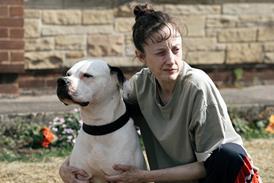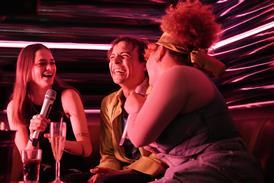Dir. Margarethe von Trotta. Germany, 2003. 136mins.
A classical, straightforward, honest and deeply felt reconstruction of a little known Second World War incident, which provided a little ray of light in a sea of darkness, Margarethe von Trotta's first feature in nine years is a worthy addition to a mass of information attempting to make sense of the most terrible period in the history of mankind. This story of a group of German women who dared demand - and ultimately obtained - the release of their Jewish husbands, arrested by the Gestapo in Berlin in 1943 and held in a Rosenstrasse building prior to their deportation to the death camps, does suffer here and there from best intentions that are more demonstrative than emotional. But it is nevertheless von Trotta's best achievement in years, after a career spent in TV of late, and should have enjoy a respectable theatrical career, mostly in Western Europe - it has already taken more than $2m in Germany - followed by a long television life. The film played in competition at Venice, where Katja Riemann won Best Actress.
The past is framed here by the contemporary story of a young American woman, Hannah (Maria Schrader), who goes back to Germany to find out more about the childhood years of her mother, Ruth (Jutta Lampe), of which she knows little. In Berlin, she manages to find Lena (Doris Schade), the woman who saved her mother's life during the war. She is now 90, and her reminiscences provide a series of long flashbacks in which she gradually relives her past.
The daughter of German bluebloods who incurred her father's wrath by marrying a Jewish musician, young Lena (Katja Reimann) turned her back on her own parents and shared the fate reserved by the Nazis for mixed marriages, which offered limited protected for Jewish partners. But when the Gestapo decide, in 1943, to implement The Final Solution and send Berlin's remaining Jews to Auschwitz, Lena starts moving heaven and earth in her attempts to save her husband.
She finally reaches the house of the Jewish community on Rosenstrasse, converted by the German into a temporary prison, to find many other women sharing in the same predicament. Among them, eight-year-old Ruth (Svea Lohde) whose mother is also detained inside and who chooses Lena for her adoptive mother. Despite Gestapo threats, the women refuse to budge and persist. It results in a miraculous turn of events when Goebbels releases the prisoners, planning to pursue the operation at a more opportune moment.
Rosenstrasse combines two of von Trotta's main thematic interests, modern German history and the role of women in within it, and as such a project she has nursed for a long time. it has gone through a number of adjustments before reaching its final shape, and some of these adjustments leave their uncomfortable imprints over it. The contemporary story that frames the historical events seems rather contrived by comparison, and the picture might have done better without some reconstructed episodes, such as the nightclub sequences in pre-war Berlin or the encounter between young Lena and Goebbels.
But for most of the time, von Trotta keeps a tight control on events and does not allow emotions to run away too much, allowing the material to speak for itself and taking care to be not only politically but also humanely correct in her portrayal of events. Predictably enough, the female characters work much better than the male ones, with Reimann as the young Lena and Schade as the older version, most impressive of all.
The film is well served by Franz Rath's cinematography and the wide screen is used effectively used at all times, with the contrast between the natural colours of the present and the almost monochromatic past (in which the red of the Nazi flags is even more striking) supplying the right balance of ambience.
Prod cos: Studio Hamburg Letterbox Filmproduktion, Tele Munchen, Get Reel Productions
Int'l sales: StudioCanal
Ger dist: Concorde Filverlein
Prod: Richard Schops, Henryk Meyer, Markus Zimmer
Scr: Margarethe von Trotta, Pamela Katz
Cinematography: Franz Rath
Ed: Corina Dietz
Prod des: Heike Bauersfeld
Cost des: Ursula Eggert
Music: Loek Dikker
Sound: Eric Rueff
Cast: Katja Reimann, Maria Schrader, Jutta Lampe, Martin Feifel, Jurgen Vogel, Doris Schade, Fedja van Huet, Carola Regnier, Svea Lohde, Lean Stolze

















No comments yet